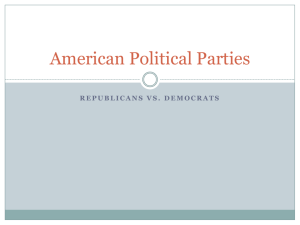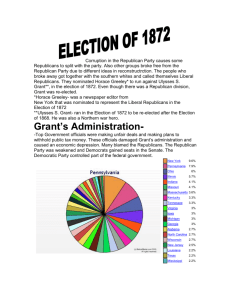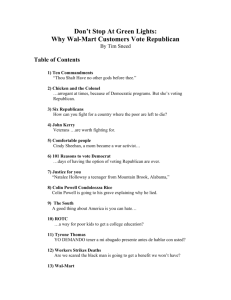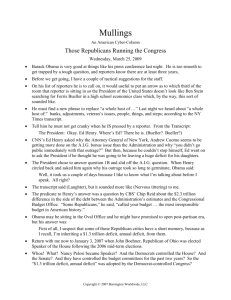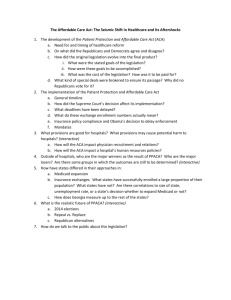UCSF - National Institute of Health Policy
advertisement
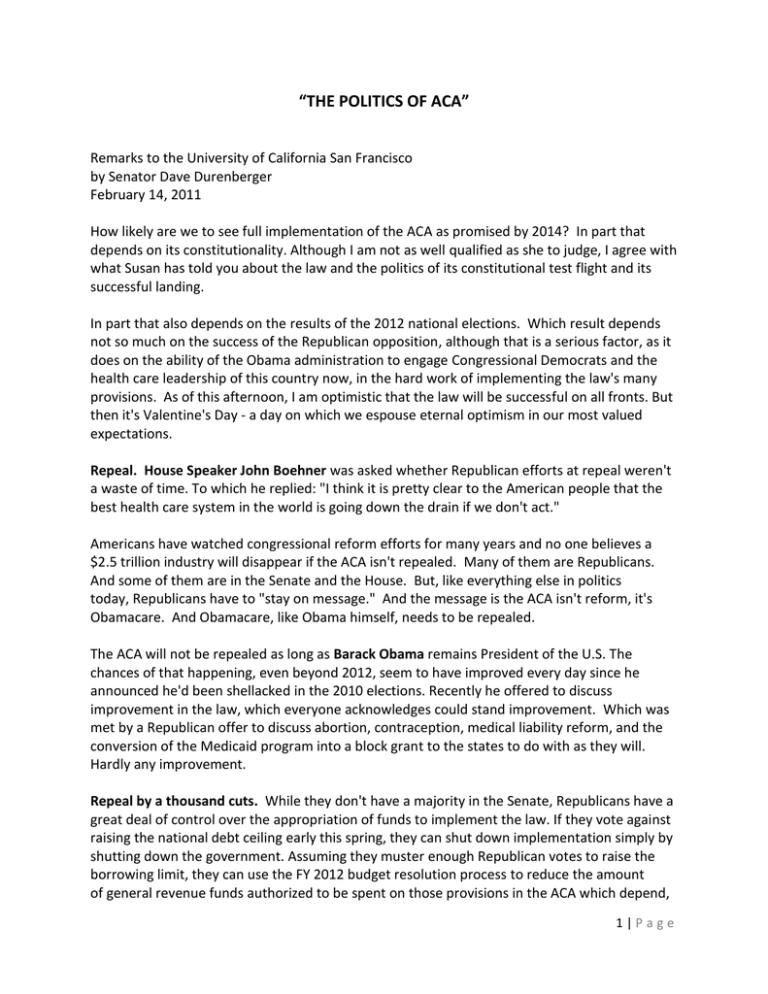
“THE POLITICS OF ACA” Remarks to the University of California San Francisco by Senator Dave Durenberger February 14, 2011 How likely are we to see full implementation of the ACA as promised by 2014? In part that depends on its constitutionality. Although I am not as well qualified as she to judge, I agree with what Susan has told you about the law and the politics of its constitutional test flight and its successful landing. In part that also depends on the results of the 2012 national elections. Which result depends not so much on the success of the Republican opposition, although that is a serious factor, as it does on the ability of the Obama administration to engage Congressional Democrats and the health care leadership of this country now, in the hard work of implementing the law's many provisions. As of this afternoon, I am optimistic that the law will be successful on all fronts. But then it's Valentine's Day - a day on which we espouse eternal optimism in our most valued expectations. Repeal. House Speaker John Boehner was asked whether Republican efforts at repeal weren't a waste of time. To which he replied: "I think it is pretty clear to the American people that the best health care system in the world is going down the drain if we don't act." Americans have watched congressional reform efforts for many years and no one believes a $2.5 trillion industry will disappear if the ACA isn't repealed. Many of them are Republicans. And some of them are in the Senate and the House. But, like everything else in politics today, Republicans have to "stay on message." And the message is the ACA isn't reform, it's Obamacare. And Obamacare, like Obama himself, needs to be repealed. The ACA will not be repealed as long as Barack Obama remains President of the U.S. The chances of that happening, even beyond 2012, seem to have improved every day since he announced he'd been shellacked in the 2010 elections. Recently he offered to discuss improvement in the law, which everyone acknowledges could stand improvement. Which was met by a Republican offer to discuss abortion, contraception, medical liability reform, and the conversion of the Medicaid program into a block grant to the states to do with as they will. Hardly any improvement. Repeal by a thousand cuts. While they don't have a majority in the Senate, Republicans have a great deal of control over the appropriation of funds to implement the law. If they vote against raising the national debt ceiling early this spring, they can shut down implementation simply by shutting down the government. Assuming they muster enough Republican votes to raise the borrowing limit, they can use the FY 2012 budget resolution process to reduce the amount of general revenue funds authorized to be spent on those provisions in the ACA which depend, 1|Page not on the Medicare trust fund, but on general revenue. A veto of any appropriations bill including such defunding language, will also create a stalemate which can shut down government. The American people hold the key to implementation right now. Campaign consultants for both parties know that it will be traditionally independent voters who will decide the 2012 election. You can tell that by reading public opinion polling analysis every week. These are likely voters who are also center-right Republicans like me, and center left Democrats like Phil Lee. They know the importance of health reform. They want to know more about what it means to them and to other Americans. They don't want to be told it's all bad. And they don't want to be told only Republicans have the answer. So they oppose "shut down or shut up" tactics. Public opinion. In 2010, Obamacare was congressional legislation that reflected more the polarity of politics in Congress and the nation, than the will and the expressed interests of the American people. Today it is the law of the land and people are paying attention to what that might mean to them. To understand how public opinion might change today, we need to understand that Americans are ambivalent about reforming a system they cannot afford. They like their own doctor, but believe the system costs too much. But they aren't sure whom to trust to change it. To have the right answer to a problem they really don't understand. In other words, who has their best interests at heart? For as long as I've been involved in national politics, public opinion polls have shown that, by a margin of almost 2 to 1, if the political issue is access to health care, Democrats are trusted more than Republicans. On the other hand, if the issue is government spending and taxes and the budget deficit and regulation and whom do you trust to change it. The answer is Republicans. Which brings me to contrast the last election with the next. The 2010 election campaign. The campaign began in the summer of 2009 when a lot of antiObama, anti-liberal, anti-government, social issue, and Republican forces came together to fight what they called the continued expansion of government power over our lives. All the battles earlier that year involving the exercise of government power - like TARP and The Stimulus and The Bail Out and The Cash for Clunkers - were over, and Obama had won. Big government, big spending, big deficits and the tax increases coming when Bush tax cuts expired, had won. When big government is the issue, Republicans can win. So Republicans decided to cash in on Obamacare. President Obama was going to spend whatever it took to add 32 million Americans to Medicaid and the Republicans decided to strike back. Makes no difference that they had spent $1 trillion in 2004 to expand prescription drug and Medicare Advantage coverage for seniors on Medicare. Makes no difference that the economy started tanking on their watch. It was on Obama's that unemployment was stuck at 10% and "jobs" not government spending was the alternative. 2|Page It made no difference that in 2008 a bi-partisan group of senators under Democrat Ron Wyden and Republican Bob Bennett had crafted a similar plan; nor that the Senate Finance committee members and staff had worked three years on a bi-partisan reform proposal they published in December 2008. And, that six Senators from both parties were meeting regularly during 2009 to find agreement on reform. This was a political opportunity to be seized and they did. In part because they were hounded by the Wall Street Journal, Fox News, Talk radio, Glen Beck's new Tea Party and a hundred opportunity seekers. The House Republican leaders branded themselves the "Young Guns" and began an effort to take back the majority they'd lost in 2006. The face of the effort was Sarah Palin. The face of Big Government liberals was Nancy Pelosi. Senate Republican health reformers like Chuck Grassley of Iowa were threatened with loss of their chairmanships in a Republican majority. Utah's Bob Bennett had the Senate seat which he held, and his father held before him, taken away by angry Tea Partiers. Senate Republicans chose an orthopedic surgeon from Wyoming - a state with fewer hospital discharges per year in the whole state than does UCSF - to be their policy expert and spokesperson. They sought out more doctors to run for Congress and ended up electing 20 of them just to take on Obamacare. A Parliamentary Democracy. Republicans have effectively become a national party, representing the ideology of its current base in the south, the mountain west, and rural America. They have turned a constitutional representative democracy into a parliamentary democracy. There is no room in that party for pragmatic conservatives such as those who helped shape the policies that made Ronald Reagan a successful President. The partisan campaign to repeal President Obama has all Republicans on message today with 2010. Health reform is about more government, more spending, more taxes, and more regulation. It's about evidence based medicine and comparative effectiveness research interfering with the doctor-patient relationship. It's about consumer directed health care for people who can afford high deductible indemnity insurance, bought over state lines and outside employment, and financed by federal and state taxpayers through Health Savings Accounts. To Republicans HSAs are not public spending, but consumer choices, even though they provide tax reduction to those with incomes high enough to afford them. Buying over state lines simply means purchasing by premium in states without any market rules to protect individual indemnity insurance customers. Privatizing Medicare and block granting Medicaid to states simply means turning this new indemnity insurance industry loose on the mentally ill, the homeless, the disabled and the low\no income. It means abandoning any effort to measure and compare effectiveness of medical professions and medical technology so as to better inform consumers of health care services. The contrast in coverage, quality, and affordability between this plan and the new health policy law is stark. But most Americans don't get it. Yet. 3|Page Implementation is the Key to Public Opinion. The President and his party must win this next election by making health reform the question and the ACA implementation the answer. Consider this political reality: 23 of the 33 U.S. Senate seats up for re-election next year are held by Democrats. Three of whom have already elected not to run again. If nothing changes, Republicans are likely to swing the current 53-47 Democratic majority in the Senate in their favor. That means in 2013, Republicans in Congress, not the President set the health policy agenda. The ACA implementation problem we face is not the complexity of the law as much as it is its communications or messaging. Most Americans still judge health reform by the 13-month process to get to the law, by the mega million dollar election campaigns against it, and by the criticism of specific provisions by self-interested health industries. The ACA is the messaging Democrats need to turn public opinion around and hold their own or better in 2012. The administration has a first rate HHS team in place which has been at this for nearly a year. But so far, the White House shows little sign of a strategy for making implementation the message. Every Democrat who supported the law should be committed to running on the law. Republicans announced weeks ago their intent to hold so many oversight hearings of the law that the Secretary of HHS and assistant secretaries would have to get permanent parking places on Capitol Hill. The administration ought to rent spaces for Secretary Sebelius and for Don Berwick and ask both the Senate and the House to hold hearings on implementation every day of the week. Especially on Mondays and Fridays when Republicans would rather be back home campaigning against a law they know little about. People in leadership positions in every profession and every industry across this country should know that the current health policy is sapping the strength of our health systems, of our economy, of our international competitiveness, of entitlement programs and of our promises to future generations of Americans. These leaders need to support implementation and improvement of the ACA. In that order if necessary. Starting with key leadership in the health professions and institutions. They need to become much more involved and more visible in the implementation process. Not sitting on the sidelines, as many health care associations did, while House and Senate Republicans voted unanimously to kill the law and the potential for good health policy reform. Washington logic says if it looks like Republicans might win in 2012, don’t stick your neck out for a law that has a few flaws today. Let me tell you something. I was there for the so-called Reagan Revolution. In fact, I was a Republican running for re-election in a presumed Democratic state in November 1982 when Reagan’s unemployment in my state was 11%. I won, but just barely – as did a half dozen other pragmatic Republicans. It was we who did the heavy lifting that made it possible for the President to win in a landslide just two years later. So he could claim a revolution. I believe that history is repeating itself. A new generation of leaders are facing more challenging times than we faced in the 1980s. Those, like President Obama, who acknowledge it and believe 4|Page Americans can shape it for the better, will change the course of history. Those who do nothing but oppose it, will not. When I think about the uniqueness of what we call the U.S. health care system, I see potential for "exceptionalism." If the incentives and the rewards (professional and financial) were appropriately aligned and the role of government well defined. That’s the purpose of the ACA. But someone must point the way. That’s why we call health reform “a race to the top.” We are a nation of "health systems" which vary by geography, demography, economics, and practice culture. Northern California is one of those places where, largely because of the practice culture, you can see the future of a better American health care system. If health care leaders agree on that reality, the Affordable Care Act can help work wonders. 5|Page

